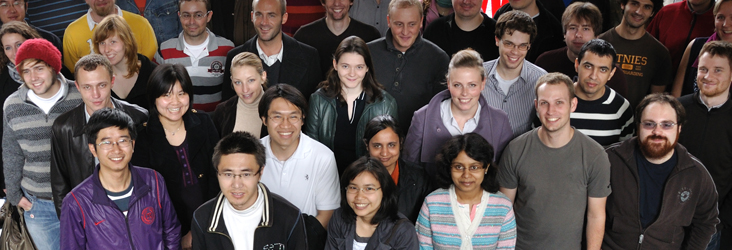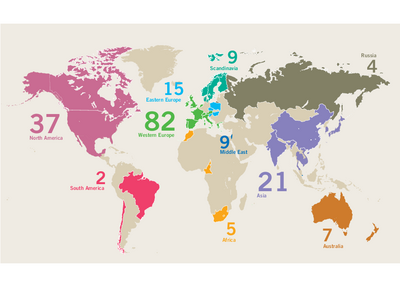
International Partners & Relations
Owing to the international reputation of the scientists working at IWR and IWR’s international orientation, a multitude of close individual personal contacts of our members to international partners all over the world exist. These are by far too many to be listed in detail, however, these form the basis for the international spirit of IWR and its collaborations and research activities.
A signature aspect of our international activities is the focus on supporting research in developing countries of Southeast Asia, e. g., Cambodia, Thailand, Vietnam, Myanmar and Laos. The intention of IWR in these countries is mainly to promote scientific computing by joint research projects, organizing conferences on topical issues, and promoting scientific exchange in an Erasmus Mundus program. Indeed, former doctoral students of IWR now hold important positions in these countries.
IWR also profits substantially from the high international visibility and the networking of Heidelberg University. The most recent example is the 4EU+ university alliance (www.4euplus.eu), which was formed in 2017 as a cooperation of research-strong partner universities to promote joint education, develop modern learning pathways for their students and engage in joint research activities. The six members Heidelberg University (Germany), Sorbonne University (France), Copenhagen University (Denmark), Warsaw University (Poland), Charles University Prague (Czech Republic) and Milan University (Italy) rank amongst the strongest higher education institutions in their respective countries.
In the development of the alliance, four flagship initiatives were defined. IWR with its partner institutes ICM (Warsaw), Nečas Center (Prague) and Laboratoire Jacques-Louis Lion (Paris) played a crucial role in defining 4EU+ Flagship 3 “Transforming science and society: Advancing information, computation and communication” and its successor “Data – Models – Transformations”. The flagship is led by IWR members Jürgen Hesser and Michael Winckler, and has its headquarters in the Mathematikon. In the first funding period of the European Universities Initiative, the flagship supported 15 projects with a focus on research-oriented teaching. The first flagship summer school was held at IWR in 2020 entitled “Mathematical and Computational Methods for Challenging Applications”.
Two new learning pathways “Artificial Intelligence in Science and Industrial Applications” and “Mathematical Modelling” are currently being developed as part of the flagship. This will lead to a strong network of master-PhD programs in the two important research areas of IWR and hopefully in a strong exchange of postgraduate students, scientists, and staff between the six European partners. Taking a lead role in this initiative enhances the European partner network of IWR considerably and also leads to joint funding applications for PhD training, the focus of the second project period of 4EU+ (“1CORE – One Comprehensive European Research University”).
In cooperation with the Department for Biotechnology of the Ministry of Science and Technology of the Government of India, IWR has developed a joint PhD training program on the topic “Big Data Research in the Biosciences”. The collaborative project of Heidelberg University with five Indian partner institutions in India, IIT Madras, IIT Kanpur, JNU New Delhi, Delhi University and Allahabad University, aims to establish a training program for joint PhD students spending half their research period in India and half at Heidelberg University. The program also provides opportunities for young scientists and senior professors to spend extended time at institutes at Heidelberg University.
While the focus on south-east Asia helped IWR to develop several long-term cooperations, Africa was largely a blind spot on the map of our scientific partners. This changed in 2017, as IWR and HGS MathComp joined forces to initiate contacts to the African Institute for Mathematical Sciences (AIMS) in Cape Town, South-Africa. AIMS is a pan-African network of centers of excellence for post-graduate training, strongly supported by the Humboldt-Foundation and with branches in five African countries. With a heavy focus on applied mathematics and applications, it is an ideal partner to initiate a sustainable alliance for research, education and training.


